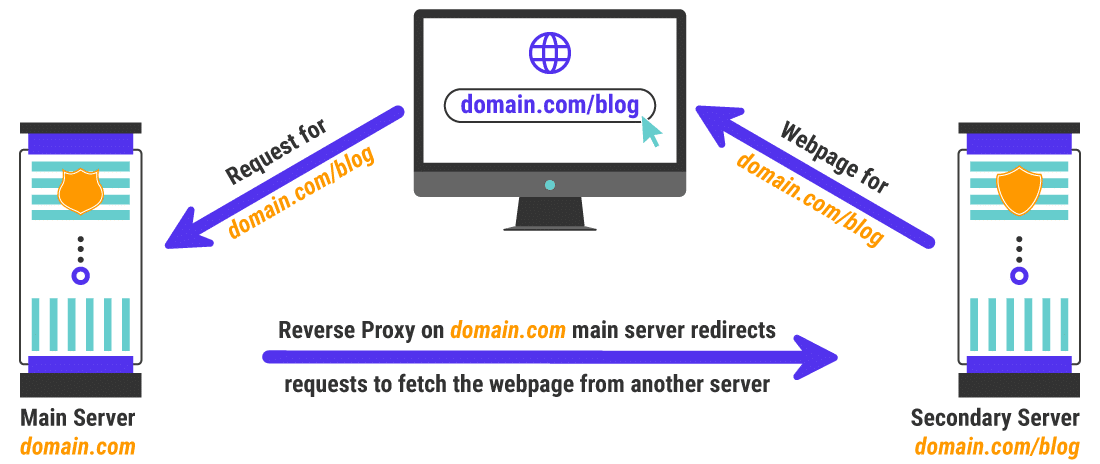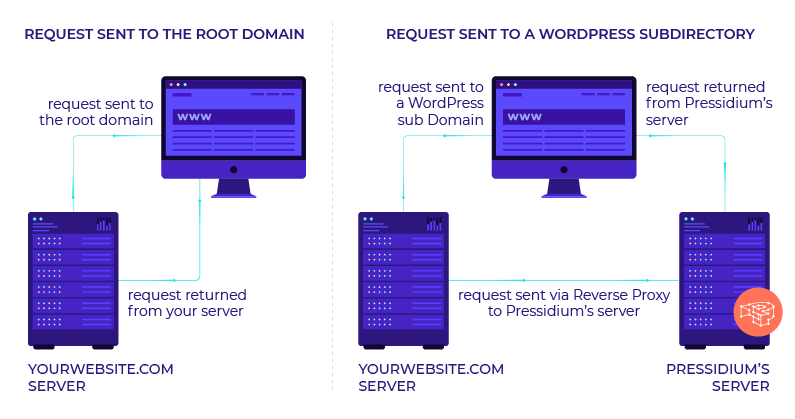Moz Q&A is closed.
After more than 13 years, and tens of thousands of questions, Moz Q&A closed on 12th December 2024. Whilst we’re not completely removing the content - many posts will still be possible to view - we have locked both new posts and new replies. More details here.
WordPress Sub-directory for SEO
-
Hi There,
I'm working on a WordPress site that includes a premium content blog with approx 900 posts.
As part of the project, those 900 posts and other membership functionality will be moved from the main site to another site built specifically for content/membership.
Ideally, we want the existing posts to remain on the root domain to avoid a loss in link juice/domain authority.
We initially began setting up a WordPress Multisite using the sub-directory option. This allows for the main site to be at www.website.com and the secondary site to be at www.website.com/secondary.
Unfortunately, the themes and plugins we need for the platform do not play nicely with WordPress Multisite, so we started seeking a new solution, and, discovered that a second instance of WordPress can be installed in a subdirectory on the server. This would give us the same subdirectory structure while bypassing WordPress Multisite and instead, having two separate single-site installs.
Do you foresee any issues with this WordPress subdirectory install? Does Google care/know these are two separate WordPress installs and do we risk losing any link juice/domain authority?
-
@himalayaninstitute said in WordPress Sub-directory for SEO:
WordPress can be installed in a subdirectory
I have done this a lot and I mean a lot what you want to do is set up a reverse proxy on your subdomain and this will allow you to not only bypass having to use multisite for subfolder but if you want to power it separately you can you do not have to it all. You should probably use your same server and power through Fastly our CloudFlare


once you set this up it is super easy to keep it running in your entire site will be much faster as a result as well
my response to someone else that needed a subfolder
https://moz.com/community/q/topic/69528/using-a-reverse-proxy-and-301-redirect-to-appear-sub-domain-as-sub-directory-what-are-the-seo-risksplease also look at it explained by these hosting companies is unbelievable easy to implement compared to how it looks and you can do so with Fastly or cloudflare in a matter of minutes
-
https://servebolt.com/help/article/cloudflare-workers-reverse-proxy/
-
https://support.pagely.com/hc/en-us/articles/213148558-Reverse-Proxy-Setup
-
https://wpengine.com/support/using-a-reverse-proxy-with-wp-engine/
-
https://thoughtbot.com/blog/host-your-blog-under-blog-on-your-www-domain
-
https://crate.io/blog/fastly_traffic_spike
*https://support.fastly.com/hc/en-us/community/posts/4407427792397-Set-a-request-condition-to-redirect-URL -
https://coda.io/@matt-varughese/guide-how-to-reverse-proxy-with-cloudflare-workers
-
https://www.cloudflare.com/learning/cdn/glossary/reverse-proxy/
-
https://gist.github.com/LimeCuda/18b88f7ad9cdf1dccb01b4a6bbe398a6
I hope this was of help
tom
-
-
@nmiletic The content section of the site requires a unique UI Design and other robust functionality, so having a separate theme/plugins in its own directory is going to be the way we go here. Thanks for your assistance!
-
@himalayaninstitute Have you thought about adding a page and making all of this new content a subpage? Or changing your permalink structure to include a category in the URL? You can then add all of these posts under that category and have the URL show up as www.example.com/category/page-or-post-name
-
The website at the subdirectory will be an online learning platform with a blog, online courses, memberships, gated content, etc. The content currently lives on the main site, so, it's great that we can move it into the subdirectory without taking a hit from Google.
Since these are fundamentally two separate websites, we're not concerned about needing to manage them independently.
Thanks again for your input and advice, we greatly appreciate it!
-
@amitydigital said in WordPress Sub-directory for SEO:
Google will view it as one site so you shouldn't have any issues from that perspective. The Google bot is just looking at pages and won't know/care that the underlying CMS that is running some pages is a different install than other pages. The downside is you now have two websites to maintain, two themes, two sets of files, etc... That may result in a bit of a headache in the future.
As @amitydigital put it, the issue with your approach would be repetitive tasks. You will not loose any DA nor PA (being that you implement a correct 301 redirection). What is going to be on the subdirectory?
-
Google will view it as one site so you shouldn't have any issues from that perspective. The Google bot is just looking at pages and won't know/care that the underlying CMS that is running some pages is a different install than other pages. The downside is you now have two websites to maintain, two themes, two sets of files, etc... That may result in a bit of a headache in the future.
Got a burning SEO question?
Subscribe to Moz Pro to gain full access to Q&A, answer questions, and ask your own.
Browse Questions
Explore more categories
-
Moz Tools
Chat with the community about the Moz tools.
-
SEO Tactics
Discuss the SEO process with fellow marketers
-
Community
Discuss industry events, jobs, and news!
-
Digital Marketing
Chat about tactics outside of SEO
-
Research & Trends
Dive into research and trends in the search industry.
-
Support
Connect on product support and feature requests.
Related Questions
-
Why Product pages are throwing Missing field "image" and Missing field "price" in Wordpress Woocommerce
I have a wordpress wocommerce website where I have uploaded 100s of products but it's giving me error in GSC under merchant listing tab. When I tested it show missing field image and missing field price. I have done everything according to https://developers.google.com/search/docs/appearance/structured-data/product#merchant-listing-experiences and applied fixed i.e. images are 800x800 and price range is also there. What else can be done here?!merchant listing.jpg
Technical SEO | | Ravi_Rana0 -
Wordpress Comments Pagination
Hi Mozzers What is your view on the following. Should you Paginate comments to increase page speed? If yes, at what # of comments would you begin pagination? (with the objective being decreasing page load times) Apply rel="canonical" back to the main article URL? eg: url/comment-page-1 => url noindex the comment pages? create a "View all" comments page? Thanks in advance for your help! 🙂
Intermediate & Advanced SEO | | jeremycabral
J0 -
How to do geo targeting for domain and sub directories in Webmaster tool?
Hello All, How can i do geo targeting in multiple countries on my ** root domain and sub **directories in Webmaster tool. My domain is "abc.com" and i want to target three countries UAE , Kuwait, Saudi arabia. So, Can i assign geo targeting in Webmaster tool , Root domain for UAE country and make other two sub directories for Kuwait and saudi ? abc.com - UAE (geo targeting) abc.com/kw - Kuwait (geo targeting) abc.com/sa - Saudi (geo targeting) Or Root doamain should be not assign for any country and Make three sub directories for UAE, Kuwait , and saudi and targeting them there geo locations. abc.com - Unlisted (geo targeting) abc.com/uae/ - UAE (geo targeting) abc.com/kw/ - Kuwait (geo targeting) abc.com/sa/ - Saudi (geo targeting)
Intermediate & Advanced SEO | | rahul110 -
Changing Servers + Effect on SEO
Hi, I am currently with a very slow server. Our website takes quite a while to load, FTP is very slow and content changes with Wordpress are slow because even the database connection takes a lot of time. However, my website ranks very well. Traffic has doubled in the last year. Our domain has been registered with this company for over 10 years. I am wondering if changing to a different hosting provider would have an effect on my rankings due to the change in IP.
Intermediate & Advanced SEO | | MangoMan160 -
Iframe redirect bad for SEO?
Hi, I have a website (http://www.blowingminds.de) wich I put a spreadshirt shop into via iframe. The thing is I am not sure on how the iframe effects my SEO? Can I just optimise the main domain for search? Well I want the spreadshirt shop to be found under the domain name (www.blowingminds.de) but the only real way to do it is by implementing an iframe because each spreadshirt shop has its own subdomain eg.: blowingminds.spreadshirt.de but the only real way to do it is via iframe, as they do not offer a complete domain redirect. (Or have I overseen some other way?) I hope you guys can help me on this one 🙂 Thanks in advance. Malte
Intermediate & Advanced SEO | | wellbo1 -
Migrating online store to subdomain using shopify and effects on seo and energy down the road for seo
I'm looking for some clarity... Looking at using Shopify for an existing online store that we have to migrate. Setting up the store with shopify means we will be using a subdomain such as shop.mywebsite.com instead of mywebsite.com/shop. The following are points to consider when responding The client currently has an online store, however it's a proprietary shopping store and CMS that has since gone defunct and they need to migrate to an alternative in order to survive online against new CMS systems that allow the site and its content to be better optimized. There is a lot of existing SEO done on the current site that we don't want to loose PR on. There is roughly 2000 products Client has a fixed budget, dealing with checkout issues, custom work and various other "bugs" seems to be easier controlled with Shopify...thus budget can be used more on content/strategy and migration We want to run the main site in Wordpress and are wanting to use Shopify since it supports a gateway, has great features and seems like it would allow us to get more bang for the buck and can focus more on the main site and content strategy and drive traffic to the subdomain store if needed Or main concern is the effort of migrating 2000+ products to shopify and the traffic and PR it gives the current site will have a negative effect on the main domain itself. Should we really be considering this path? The domain is diveidc.com One main benefit to the subdomain is the ability to clearly segment products from the service portion of the site in the analytics and focus 2 clear strategies and track it in a very defined manner. We're really on the fence with this...any thoughts are welcome.
Intermediate & Advanced SEO | | MAGNUMCreative0